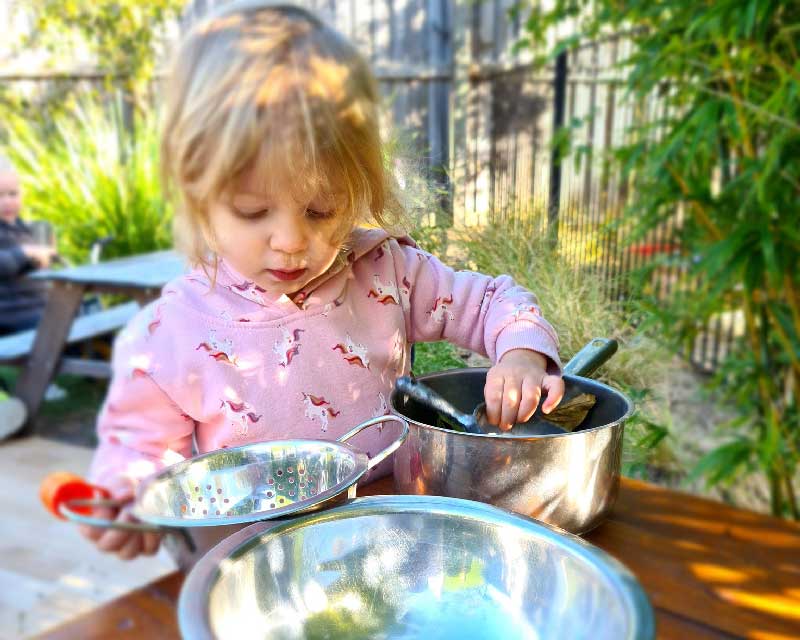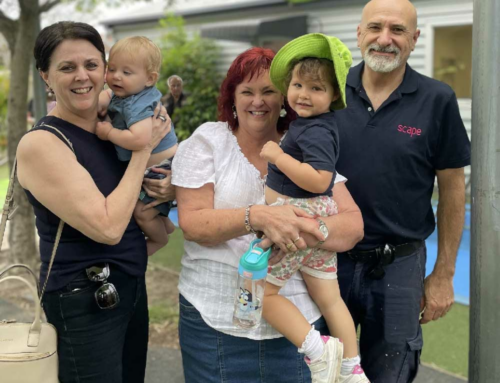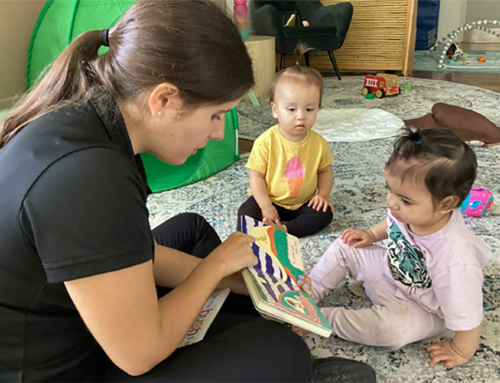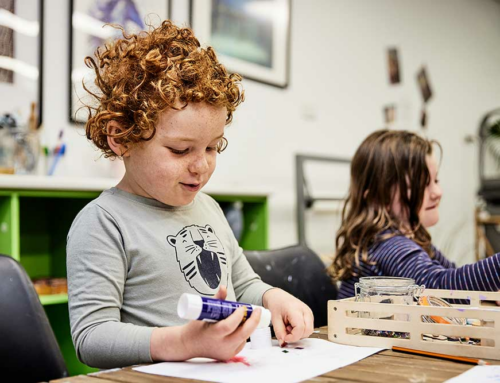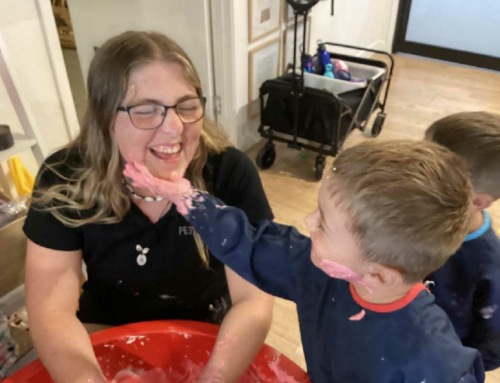Children’s emotions are a big part of their life. They learn to process and express emotions from adults. Children experience a wide range of feelings, and while some may be easier to understand than others, talking about them is vital.
Recognising and naming how they feel can help children develop the skills to cope effectively with complex emotions. Emotions can be just as challenging for adults to understand, but they are all valid, and expressing them in healthy ways is okay.
Empowering children to manage and take responsibility for their own emotions is a big part of creating a caring and respectful environment.
“We have been focusing our practices in relation to child agency and how we as educators can ensure we use soft transitions throughout the day in play and ritual times,” says Julie Ker, Education and Practice Advisor for Petit Early Learning Journey. “We use soft transitions that invite children to play and rituals that support children to have agency over their own learning journey.”
In this article, we discuss children’s emotions with Gemma Reilly, Educational Leader at Petit ELJ Clifton Hill and Liz Wisowaty, Educational Leader at Petit ELJ Wooloowin. Our conversation covers:
- Close, secure relationships
- Forming and maintaining positive relationships
- Communicating a culture of respect, equity and fairness
- Helping children to identify their emotions
- Encouraging children to regulate their emotions
- Adjusting expectations for children’s age and development
- Examples of recognising and naming children’s emotions

Building close, secure relationships
“From the moment children start,” says Gemma, “we take the time to get to know the individual child and their family. We find out everything about them and then build some of their needs and interests into our program. We offer a wide range of play-based experiences that allow children to make choices and participate in play at varying developmental levels.”
“We also recognise that forming a secure attachment is a key factor in developing children’s social, emotional, intellectual and physical well-being,” says Liz. “We build relationships through meaningful interactions with the children that are warm, caring and responsive.”
“Using the Circle of Security, we support children’s emotional needs with quality relationships and recognise that children learn best through their everyday experiences with the people they love and trust.”
Enabling children to form and maintain positive relationships
“Our studios are set up to support small group play which can encourage children’s social interactions and relationship building,” says Gemma. “We also encourage collaboration across our studios to build relationships with varying ages.”
“Kindness and respect are often a focus point in our program, where we support children’s learning about how to have a positive impact on those around them.”
“We model respectful relationships in how we address the children, other educators and our families,” says Liz. “Communication is key. We ensure the environment is set out in a way to set children up for positive interactions.”
“We support emotional intelligence in a range of ways, such as through imaginative and dramatic play scenarios, stories, yoga, meditation, and songs.”

Communicating a culture of respect, equity and fairness
“We promote respect within our centre through storytelling, group learning and role play,” says Gemma.
“Our Angel Avenue and Willow Way studios did an inquiry into how we can encourage children to be socially responsible. It included respect for each other, our environment and those around us. Our Embrace Statements involve families and educators in these values, as well as our policies, centre initiatives and events.”
“We build trust with our families through open two-way communication,” says Liz. “ We seek to bring together our families to create a strong, collaborative community. By recognising that families are a child’s first teacher, we respect and value their input into our learning program.”
Helping children identify their emotions
“Children identifying their emotions can regulate their behaviour,” says Gemma. “When adults support them to identify and name their emotions it can support children to understand their feelings and help them to develop empathy and an understanding of how somebody else is feeling.”
“By guiding and supporting children to understand their needs and help them to develop alternative strategies to regulate their emotions, we can support children through co-regulation and then self-regulation strategies,” says Liz.
“Effective self-regulation provides a foundation for children to develop and grow in a way that develops positive dispositions and skills for learning.”

Encouraging children to regulate their emotions
Developing collaborative partnerships with families on all aspects of a child’s learning supports both educators and parents to share a consistent approach.
“Families can help their children by supporting them to process their emotions,” says Gemma. “Naming their feelings can also encourage children to develop a deeper understanding of them. Also, letting them know that it is okay to have these feelings can support children’s self-esteem and encourage them to build their circle of security.”
“Some great resources are available to families, such as the ‘When I’m Feeling…’ series by Trace Moroney. Providing children with strategies and support on how to regulate their emotions is important, such as allowing them time and space if they need it, or having a quiet and calm space to go to when they want a change of environment.”
Liz’s advice to families and their children is to not “be afraid to show your own emotions! Talk about your feelings and emotions. Talk about what we can do if we feel a certain way. What does being happy feel like? What does being sad feel like? What can I do if I’m feeling angry or frustrated?“
“Families can reach out to their educators for strategies used within our centres. Our educators are very knowledgeable and can support you with children’s emotions and big life changes. In turn, we can discuss what approaches are successful at home. Speak to your Educational Leader, for more information and research.”

Understanding feelings: Adjusting expectations for children’s age
“Our expectations have to be adjusted based on children’s age and development,” says Gemma. “From a young age, we can begin naming emotions and giving children lots of connection to support them when they have big feelings. As they grow, families can encourage children to build on their self-regulation.”
“With younger children you can incorporate visuals, such as what do feelings look like?” says Liz. “And how do they make our body feel? It is important to not rush children when giving answers but to give children time to feel their emotions. “
“With older children, give them the language and tools to discuss their emotions. All emotions should be recognised, not just the ‘positive’ ones.”
Examples of recognising and naming children’s emotions
“In our Treasure Cove studio,” says Gemma, “the children have spent some time focusing on the Zones of Regulation. They had a display in the room in the check-in corner that showed the feelings in each zone. Over a few weeks, you could see children coming to us and naming their feelings more often.”
“Our families also shared with us that their children had been recognising their feelings at home, such as telling their parents they were feeling in the blue zone today. This was a great experience for the children to be able to communicate their feelings.”
“We have continued to build on this by having a ‘quiet room’ available throughout the day for children to go into when they want to check in with themselves.”

Nurture your child’s wellbeing with Petit Early Learning Journey
At Petit ELJ, we recognise families as the child’s first educators. Listening, understanding, and partnering with parents is crucial to our relationship. We value our families and the matters that are important to them, such as their child’s emotional wellbeing.
We provide many platforms to support the different ways that parents engage with our community. At the heart of our relationship is trust, built on open and honest communication. Learn more about how we can support your family and child’s education and care by contacting your nearest centre.
